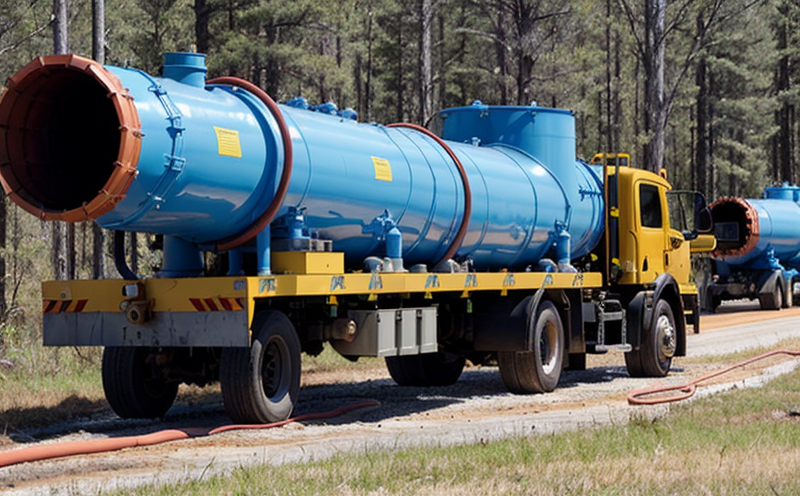EN 12599 Functional Testing of Gas Pipeline Ventilation Systems
The EN 12599 standard is critical for ensuring safe and efficient operation of gas pipeline ventilation systems. This standard defines the functional testing procedures to ensure that these systems are capable of maintaining a safe pressure differential between the inside and outside environments, which is essential in preventing explosions or other hazardous situations.
Testing under this standard involves several key steps: initial inspection of the system for any visible defects or damage; setting up a controlled environment for testing; applying specified pressures to simulate real-world conditions; monitoring the performance of the ventilation system against defined thresholds; and recording detailed findings in compliance with EN 12599 requirements.
The ventilation systems are crucial because they play a vital role in maintaining pressure differentials that can prevent gas from escaping into areas where it could ignite. These systems must be rigorously tested to ensure they meet the stringent safety standards set by EN 12599 and other relevant international standards like ISO/IEC.
Failure to adhere to these testing procedures can result in significant risks, including potential explosions, loss of life, property damage, and environmental contamination. Therefore, it is imperative for stakeholders involved in natural gas distribution networks to conduct thorough functional tests as per the requirements outlined by EN 12599.
To ensure compliance with this standard, laboratories must possess state-of-the-art equipment capable of simulating various scenarios that a gas pipeline ventilation system might encounter during its operational lifecycle. This includes high-pressure chambers, sensors for measuring pressure differentials accurately, data acquisition systems to record all relevant parameters throughout the test process, and software tools designed specifically for generating reports compliant with EN 12599.
Accurate testing ensures that any deficiencies in design or manufacturing can be identified early on, allowing for corrective actions before they lead to more serious issues down the line. By adhering strictly to this standard, operators of natural gas distribution networks demonstrate their commitment to public safety and environmental protection.
- Customer Impact: Ensures safe operation of ventilation systems, reducing risks associated with pressure differentials.
- Safety: Prevents explosions and other hazardous situations by verifying proper functioning of the system.
- Data Accuracy: Precise measurements help identify potential problems early on, enabling timely interventions.
Why It Matters
The safety of natural gas distribution networks is paramount, given their widespread use across residential and commercial sectors. Any breach in the integrity of the ventilation system could lead to severe consequences such as fires or explosions. By conducting functional tests according to EN 12599, operators ensure that these risks are minimized.
These tests not only protect public safety but also enhance operational reliability and efficiency. A well-maintained ventilation system helps in maintaining optimal conditions within the pipeline network, thereby improving overall performance. This translates into reduced downtime, lower maintenance costs, and enhanced customer satisfaction.
Moreover, compliance with EN 12599 demonstrates a company's commitment to regulatory standards, which is increasingly important as governments worldwide implement stricter regulations for environmental protection and public safety. Adhering to such standards can help operators build trust with stakeholders and improve their reputation in the market.
Customer Impact and Satisfaction
- Enhanced Safety: Customers benefit from a safer environment due to reduced risks associated with pressure differentials.
- Improved Efficiency: Better performance of the ventilation system leads to more efficient operations, resulting in cost savings for customers.
- Better Reputation: Compliance with regulatory standards enhances a company's image, making it easier to attract new clients and retain existing ones.
In addition, by ensuring that all systems meet the required safety levels as per EN 12599, companies can provide peace of mind to their customers. This fosters long-term relationships built on trust and reliability.
Environmental and Sustainability Contributions
The implementation of rigorous testing protocols like those specified in EN 12599 contributes positively towards environmental sustainability by minimizing the risk of accidents that could lead to significant pollution events. Such incidents would have detrimental effects on ecosystems, human health, and biodiversity.
Besides preventing potential disasters, adhering to this standard supports broader goals related to sustainable development. For instance, ensuring reliable gas supply networks helps in reducing wastage during transportation and distribution processes. Additionally, it facilitates better management practices that contribute to overall sustainability efforts.





